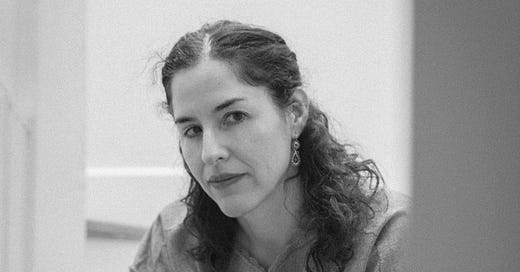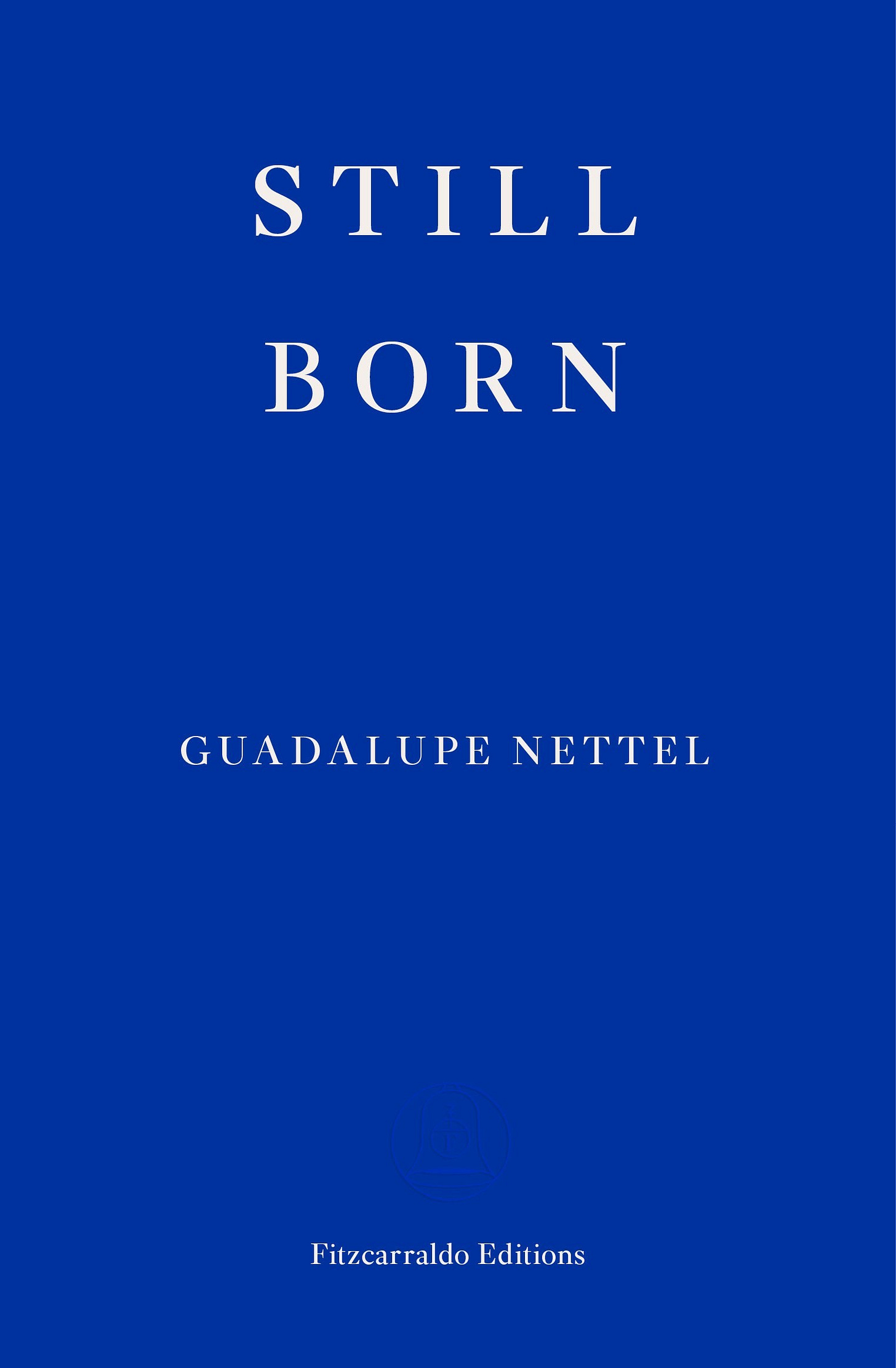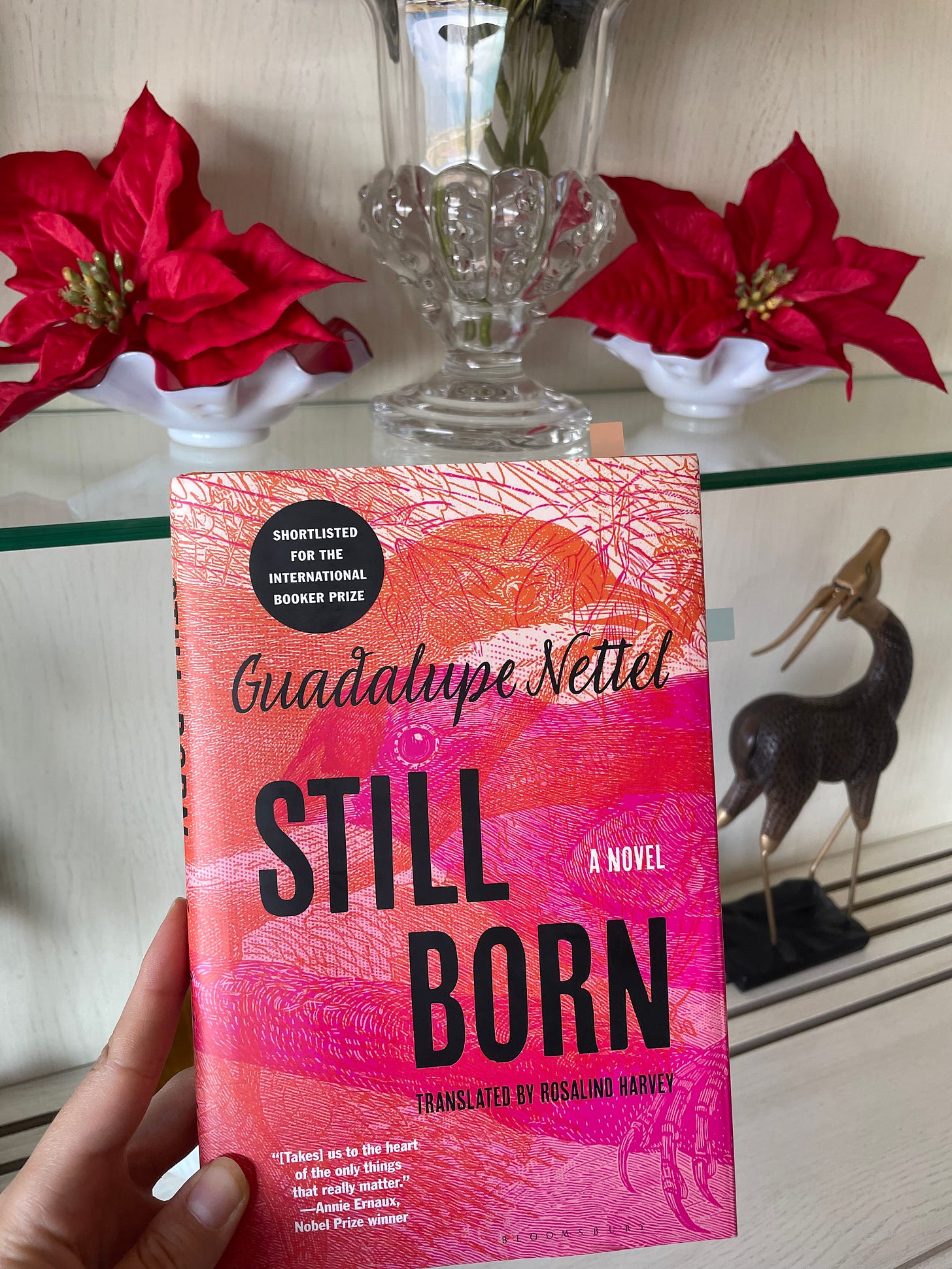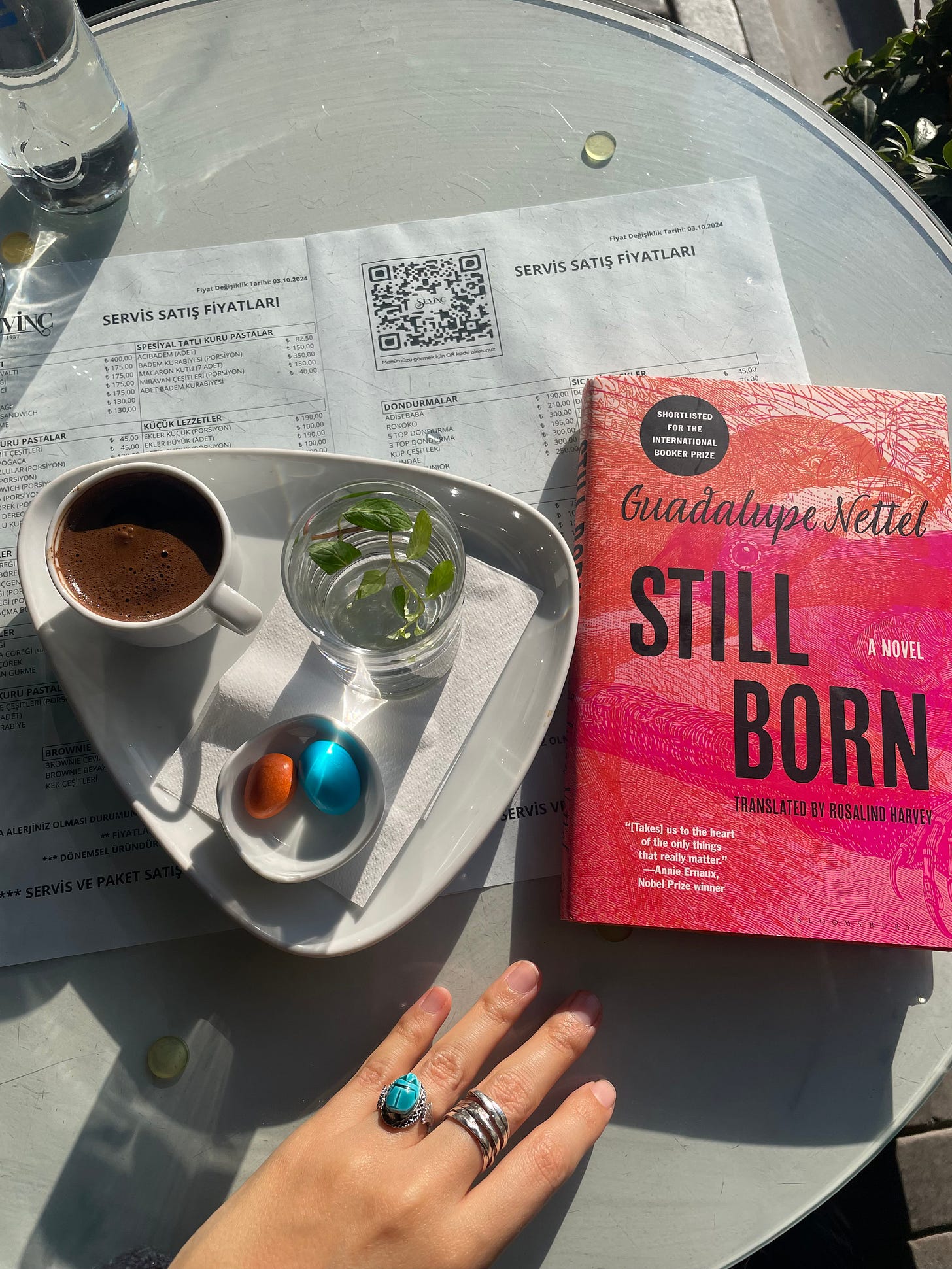The Book I Thought I’d Write—Until Nettel Did
There’s No Such Thing as a "Normal" Mother: Community, Care, and the Many Forms of Mothering
“It is easy, when we are young, to have ideals and to live according to them. What is more complicated is acting consistently over time, and in spite of the challenges life puts in our way.”
― Guadalupe Nettel, Still Born.
*
“We daughters have a tendency to see in our mother’s mistakes the source of all our problems, and our mothers tend to consider our defects as proof of a possible failure.”
― Guadalupe Nettel, Still Born.
Disclaimer:
I didn’t plan to publish this on March 8th—International Women’s Day. The timing is purely coincidental; I scheduled it for today simply because Still Born is our book club pick, and we have our discussion tomorrow.
I've never been a big fan of March 8th, as it often serves as an excuse to celebrate women for a single day while ignoring their existence for the other 364. Even when women are acknowledged, the spotlight tends to favor those from dominant or more visible backgrounds, while the struggles and achievements of Black, Indigenous, Latina, Asian, Middle Eastern, Palestinian, and many other women of color are too often sidelined or erased.
And yet, here we are—on this very day—discussing Still Born, a brilliant novel about women, centered on women with a Mexican background, written by the superb Mexican writer Guadalupe Nettel. Pure chance, pure coincidence. I suppose it was meant to be.
Guadalupe Nettel asks: What makes a mother?
I had always envisioned writing a book—constantly shaping it in my mind. And then, Nettel wrote it. Now, I am finally free. I believe that reading this book will inspire readers, both men and women, to question practices we often accept as natural and unchangeable. In particular, women may gain a broader perspective on motherhood and find greater clarity in shaping their own lives.
With Still Born, her latest work, Nettel—an extraordinary Mexican writer—offers a profound exploration of new forms of kinship, the subversive power of childlessness, and why, as she boldly states in an unforgettable interview, “it is far more difficult to control a childless woman.”
Before we delve into our discussion of this magnificent novel, let’s briefly address the gendered expectations of our beloved society.
Why Is Sentimentality Demanded of Women?
As the Elaine Benes of this godforsaken life, let me tell you—being unsentimental can be incredibly freeing. ✌🏾
Buuuuuut, as women, we are often expected, if not required, to be sentimental when discussing children and family. This is just another energy-draining burden we are made to carry. A balanced approach that allows for both sentimentality and detachment seems ideal. However, as always, men are never labeled as unsentimental when they speak about children in a neutral manner (for instance, when men say they don’t want children). Women, on the other hand, are.
Guadalupe Nettel’s Still Born explores the complexities of motherhood with a deliberate restraint—one that some have described as “unsentimental.” Specifically, it was The Economist that labeled the novel this way when selecting it as one of its best books of 2022. Of course it was The Economist—who else? In its review, the magazine highlights the novel’s precise, unembellished prose and its portrayal of characters navigating maternal ambivalence without sentimentality.
I loved Nettel’s tone for this very reason. By stripping away overt emotion, she creates space for a nuanced examination of motherhood—one that resists easy moralizing or dramatization. This narrative choice allows for an exploration of maternal ambivalence without the embellishments of overt emotion, offering a clear-eyed examination of the subject.
The expectation, or rather, the demand, that discussions about motherhood be emotionally charged is inherently sexist. Having children is simply another decision, and it should be treated as such. Just like any other life decision, it doesn’t necessarily require a performance of sentimentality, yet women are burdened with this expectation. Why must women prove their feelings while men are granted neutrality? It’s time to dismantle these gendered expectations that insist on heightened emotional expression from women, particularly in the choices they make—or are presumed to make.
Nettel’s “unsentimental” approach is precisely what makes Still Born so powerful. By resisting the pressure to romanticize or dramatize maternal ambivalence, the novel challenges the societal expectation that women’s decisions about motherhood must be emotionally charged. It affirms what should already be obvious: such decisions are deeply personal, complex, and, above all, individual—free from the weight of imposed sentimentality.
The Fraught Question of Motherhood
“Do I want to have children?”
For a woman in her mid-thirties, the question is fraught. It’s not that she ignored it in her twenties—she considered it, but other priorities took precedence: building a life, earning a living. Then, in her thirties, a sense of urgency sets in. If the question pertains to pregnancy with her own genetic material, it can no longer be deferred. A decision must be made, or time will make it for her. The diffuse social pressure intensifies. Even those who once felt certain—whether their answer was yes or no—may find themselves overtaken by doubt. The potential for regret looms large.
This existential reckoning has been explored in several recent novels, including Sheila Heti’s Motherhood, where narrators dramatize their turmoil through obsessive thoughts and meandering digressions. In contrast, Guadalupe Nettel’s Still Born introduces a narrator who has already arrived at her resolution. This alone feels radical, a breath of fresh air in a discourse that so often frames uncertainty as the default. Because it is, in fact, normal to be certain. It is normal for a woman to know—without indecision—that she does not want children. And it is just as normal to say it out loud.
Laura, the thirty-something narrator of Still Born, understands this dilemma intimately. As a literature student in Paris, she made a firm decision in her twenties: she would remain childless. The reasons were practical—children are expensive, emotionally taxing, and curtail women’s freedom. Yet, not long after turning 33, she begins to feel the pull of pregnancy, describing it as being "seduced by the abyss from the top of a skyscraper"—a force she neither expected nor welcomed. In a moment of clarity, she refuses to yield to it or prolong the deliberation. To shield herself from societal pressure once and for all, she undergoes tubal ligation. Her partner, eager to become a father, does not take it well; their relationship unravels. She returns to Mexico City, intent on finishing her dissertation.
The Calm Intelligence of Nettel’s Writing
Laura’s voice is bright and incisive, balancing self-deprecating humor with an occasional, almost enchanting lack of self-awareness. Yet beneath the carefully arranged surface of her prose, Nettel infuses her writing with a quiet intelligence—a wisdom that never announces itself but lingers in the undercurrents.
Laura has already sorted her peers into two categories: those who, like her, prioritize autonomy by remaining childless—accepting the societal and familial disapproval that comes with it—and those who do not. Alina—Laura’s best friend, her girlie—a reserved art gallery employee, has always belonged to the first group. The two friends even share a running joke about children, calling them “human shackles.” But one night over dinner, Alina confesses that she and her partner, Aurelio, have been trying to conceive for over a year. She is about to begin fertility treatments, prepared to enlist every medical intervention available, including IVF and egg donation. “I have seen people squander fortunes,” Laura observes. Initially, she refuses to feign happiness for her most dependable friend, anticipating a rupture between them—regardless of whether Alina succeeds in conceiving. But when Alina does become pregnant, Laura finds her joy too infectious to resist.
These events alone could sustain a novel, yet they unfold within the first ten pages of Still Born.
(Please note that the following sections may contain spoilers. Nevertheless, please do read this book for your soul and well-being. And thank me later.)
Laura has maintained a personal narrative until now, but she shifts her focus to Alina’s story. Nettel’s fast-paced plot accelerates. Subtle hints of complications in Alina’s pregnancy have already been suggested. The novel’s title itself serves as a warning.
Mexico’s restrictive abortion laws prevent termination when Alina learns of the complication. Though some doctors may grant exceptions, hers doesn’t. She must carry the pregnancy to term, transforming eager anticipation into a prolonged march toward inevitable doom and anxiety.
Born in Mexico City and having lived in France, Canada, and Spain, Nettel has authored three novels. Her work often explores solitude, bodily vulnerabilities, the allure of the strange, and the lives of outsiders who resist conformity. Still Born extends these preoccupations. As Alina braces for the terrifying moment she will meet her daughter, Laura remains firmly in the role of observer and friend.
She recounts Alina’s thoughts after a counseling session shortly before the birth:
“Alina told me that those two hours a week she spent thinking about the issue helped her to not focus on it all the time; she didn’t feel it was healthy to wallow in pain, in the whirlwind of questions that assailed her whenever she let her guard down even slightly: Why has this happened? Is it bad luck? Is it my fault? Is it because of my genes, or Aurelio’s? Or a mixture of the two? What should I have done differently? Why did I get pregnant? How am I going to tell my parents? Among many, many more. She couldn’t allow herself this luxury. For the moment, at least, she had to just keep on going.”
A different version of this novel might have placed Alina at its center. Instead, Laura serves as both witness and interpreter, creating a buffer between the reader and the harrowing events. The prose—elegantly rendered in Rosalind Harvey’s translation—maintains a restrained, matter-of-fact tone. As a result, the personal tragedy of a doomed pregnancy and the failures of women’s healthcare recede. What emerges instead is a meditation on friendship:
“There are beings without whom we simply cannot conceive of ourselves in this world. Alina was one of these for me. If she disappeared, a part of me would go with her.”
— Guadalupe Nettel, Still Born.
Motherhood Can Be Very Porous
But Laura is more than a passive chronicler of Alina’s experience. Other relationships come to matter deeply, too. She befriends her neighbor Doris—“skinny, anxious, almost always in sportswear”—and her young son, Nicolás. From her apartment, Laura hears Nicolás’s violent outbursts:
“He hurls insults and profanities around, which is somewhat disconcerting in a child of his age. He also slams doors and throws all sorts of things at the walls.”
The tantrums began three years earlier, after his father died in a car accident. That man, Laura learns, had a rage problem—one that now “haunted Doris through the little boy.” As Doris sinks into a deep depression, Laura steps in. She cares for Nicolás, makes his meals, takes him on walks, and ensures he completes his homework.
Meanwhile, Laura’s own relationship with her mother quietly unravels. They abandon their Sunday breakfast ritual and go months without seeing each other. “You always judge me,” her mother says during a rare phone call, “and I’m sick and tired of that.”
Laura, however, is far less judgmental toward others.
Against all expectations, Inés does not die immediately after birth. The novel’s title takes on a new meaning—she is still born. Alina is unprepared for this outcome, dreading a future spent caring for an immobile teenage girl, changing her sanitary pads. She whispers to her daughter in her mind:
“Go away, Inés. There’s nothing for you here. Go away, and do it soon! If you stay, neither of us will have any sort of life.”
Laura never interrogates Alina, even as her thoughts stray into morally ambiguous territory. She extends the same grace to Doris, who confesses:
“Sometimes I tell myself I’d be better off if I hadn’t had him. It’s awful, don’t you think? Normal mothers don’t think those kinds of things, do they?”
Laura doesn’t answer—she doesn’t presume to know what mothers think. But Nettel, who is a mother, suggests that so-called “normal mothers” do think such thoughts. Or perhaps, that “normal mothers” do not exist at all.
“We’ve always looked after other women’s children, and there are always other women who help us take care of our own. (…) Motherhood has always been very porous. The females of lots of other species take care of other females’ young. ”
A friend of Alina’s echoes this idea: “Motherhood has always been very porous.” Still Born both supports and complicates this claim, exploring how women mother in ways that fall outside traditional definitions, while also drawing boundaries between different experiences. Laura, ever pragmatic, sees it even more plainly:
“I wasn’t even sure I could say that normal mothers existed.”
In Still Born, they don’t. And perhaps that is the novel’s central assertion: motherhood is not a singular experience, but a deeply personal and unique one.
Last Word: Recommended!
In essence, Guadalupe Nettel has crafted an intimate portrayal of several women, capturing their lives with such authenticity that it feels as if they are right before your eyes.
The novel delves into motherhood, exploring it as both a societal construct and a personal journey. It presents a nuanced and thoughtful perspective, offering a profound and multi-layered reading experience.
Regardless of your gender, make sure to read Still Born. It might help you feel better and more at peace by reducing the weight of decisions you’ve made or had to make in your journey of life.
“It is always easier to blame others for what we cannot tolerate in ourselves, what we cannot forgive ourselves for.”
― Guadalupe Nettel, Still Born.
*
“Distance is unerring proof of friendship.”
― Guadalupe Nettel, Still Born.
“If you don’t leave home, you suffocate; if you go too far, you lose oxygen.”
— Vivian Gornick on conflicting feelings about her mother—her utter frustrations with her mother and the need for her mother.









